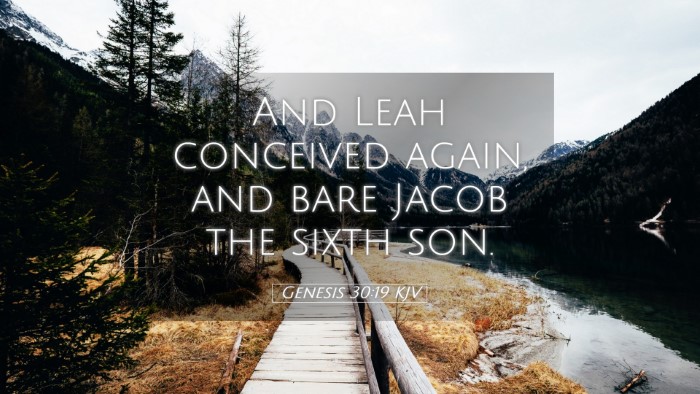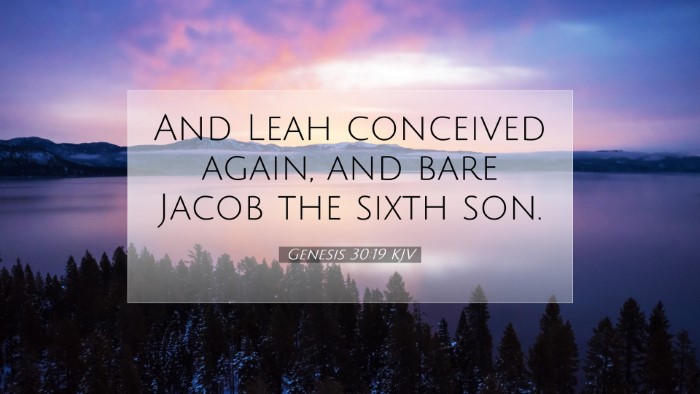Commentary on Genesis 30:19
Genesis 30:19 states, "And Leah conceived again, and bare Jacob the sixth son." This verse highlights a significant moment in the narrative of Jacob's family dynamics, particularly emphasizing Leah's role and her continued attempts to win her husband's affection.
Contextual Background
This verse is situated in the broader context of Jacob's familial relationships with Leah and Rachel. Jacob, having been tricked into marrying Leah, finds himself in a complex web of love and rivalry between his two wives. The process of bearing children is not merely a population concern; it reflects the personal and social values of the time.
Insights from Matthew Henry
1. Divine Providence: Matthew Henry posits that Leah's conception is an act of divine providence, demonstrating God's sovereign involvement in human affairs. Even in her struggles for Jacob's love and recognition, God's purpose prevails. Leah becomes a significant figure in the lineage of Israel, reaffirming that God's plans often transcend human desires and conflicts.
2. The Significance of Names: Henry discusses the importance of names in this chapter. Each name given to Leah's sons signifies her emotional state and her relationship with Jacob. The birth of the sixth son, whom Leah bears, heightens the tension of securing Jacob's affection, symbolizing not just her struggle but also God's covenantal promises to her.
Insights from Albert Barnes
1. Continuation of Generational Blessing: Albert Barnes comments on the blessing of offspring as a sign of favor in patriarchal times. The birth of another son cements Jacob's lineage and fortifies his household in a society where legacy and inheritance were of utmost importance.
2. Leah vs. Rachel: Barnes also emphasizes the rivalry between Leah and Rachel, illustrating the deeper sociocultural implications of their struggle for Jacob's affection. Leah's repeated conceptions serve as a poignant reminder of the challenges faced by women in the context of family and inheritance during this period.
Insights from Adam Clarke
1. Emotional Underpinnings: Adam Clarke delves into the psychological dimensions of Leah's situation. He notes that Leah’s repeated childbirth can be viewed as an act driven by her desire for love and acceptance from Jacob. The culmination of her maternal efforts symbolizes human longing amidst familial strife.
2. Theological Implications: Clarke also provides a theological lens on the verse, suggesting that Leah's trials and triumphs are reflective of God's engagement with humanity. Her childbirth signifies not only personal struggle but also points to the future development of Israel as a nation with divine favor, despite the complexities of personal relationships.
Theological Reflections
- Grace Amidst Rivalry: This verse underscores the theme of grace in the midst of rivalry. Leah's choices and circumstances offer a poignant reflection on how divine grace can operate in complicated human contexts.
- Legacy and Identity: The birth of a son was monumental not only for Jacob's lineage but also in shaping Israel's identity as a nation. Leah's role becomes profoundly impactful as she contributes to the heritage of the Twelve Tribes of Israel.
- The Role of Women: The narrative encourages reflection on the role of women in Scripture. Leah, despite societal perceptions, plays an indispensable role in the unfolding story of God's people, demonstrating that God's plans include and often prioritize marginalized voices.
Conclusion
Genesis 30:19 serves as a powerful reminder of the complexities of human relationships, the workings of divine providence, and the enduring significance of family in biblical narrative. By understanding Leah's plight and achievements, we gain insight into the multifaceted nature of God's covenant relationships and the ways in which they intersect with human emotions and societal constructs.


